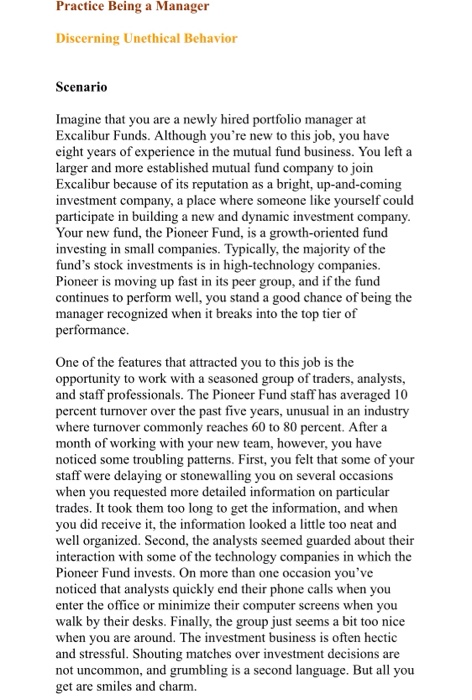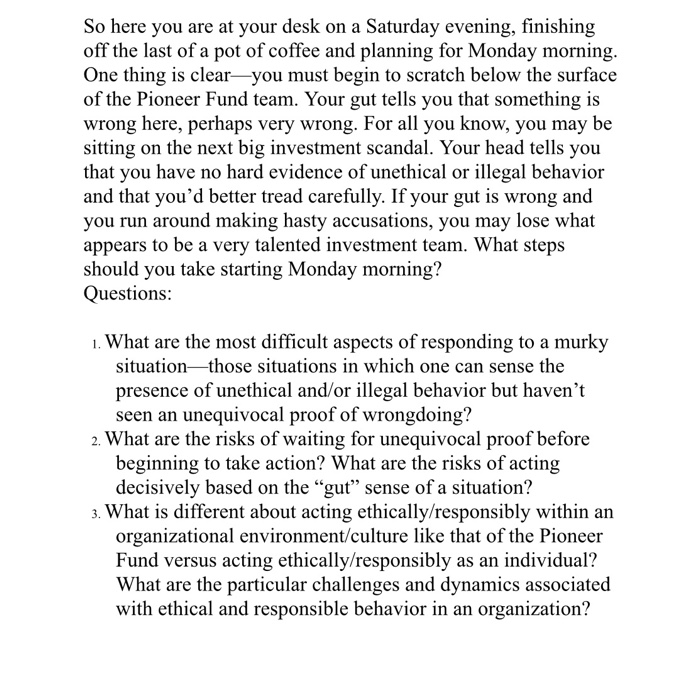Practice Being a Manager Discerning Unethical Behavior Scenario Imagine that you are a newly hired portfolio manager at Excalibur Funds. Although you're new to this job, you have eight years of experience in the mutual fund business. You left a larger and more established mutual fund company to join Excalibur because of its reputation as a bright, up-and-coming investment company, a place where someone like yourself could participate in building a new and dynamic investment company. Your new fund, the Pioneer Fund, is a growth-oriented fund investing in small companies. Typically, the majority of the fund's stock investments is in high-technology companies Pioneer is moving up fast in its peer group, and if the fund continues to perform well, you stand a good chance of being the manager recognized when it breaks into the top tier of performance. One of the features that attracted you to this job is the opportunity to work with a seasoned group of traders, analysts, and staff professionals. The Pioneer Fund staff has averaged 10 percent turnover over the past five years, unusual in an industry where turnover commonly reaches 60 to 80 percent. After a month of working with your new team, however, you have noticed some troubling patterns. First, you felt that some of your staff were delaying or stonewalling you on several occasions when you requested more detailed information on particular trades. It took them too long to get the information, and when you did receive it, the information looked a little too neat and well organized. Second, the analysts seemed guarded about their interaction with some of the technology companies in which the Pioneer Fund invests. On more than one occasion you've noticed that analysts quickly end their phone calls when you enter the office or minimize their computer screens when you walk by their desks. Finally, the group just seems a bit too nice when you are around. The investment business is often hectic and stressful. Shouting matches over investment decisions are not uncommon, and grumbling is a second language. But all you get are smiles and charm. So here you are at your desk on a Saturday evening, finishing off the last of a pot of coffee and planning for Monday morning. One thing is clear-you must begin to scratch below the surface of the Pioneer Fund team. Your gut tells you that something is wrong here, perhaps very wrong. For all you know, you may be sitting on the next big investment scandal. Your head tells you that you have no hard evidence of unethical or illegal behavior and that you'd better tread carefully. If your gut is wrong and you run around making hasty accusations, you may lose what appears to be a very talented investment team. What steps should you take starting Monday morning? Questions: 1. What are the most difficult aspects of responding to a murky situationthose situations in which one can sense the presence of unethical and/or illegal behavior but haven't seen an unequivocal proof of wrongdoing? 2. What are the risks of waiting for unequivocal proof before beginning to take action? What are the risks of acting decisively based on the "gut" sense of a situation? 3. What is different about acting ethically/responsibly within an organizational environment/culture like that of the Pioneer Fund versus acting ethically/responsibly as an individual? What are the particular challenges and dynamics associated with ethical and responsible behavior in an organization? Practice Being a Manager Discerning Unethical Behavior Scenario Imagine that you are a newly hired portfolio manager at Excalibur Funds. Although you're new to this job, you have eight years of experience in the mutual fund business. You left a larger and more established mutual fund company to join Excalibur because of its reputation as a bright, up-and-coming investment company, a place where someone like yourself could participate in building a new and dynamic investment company. Your new fund, the Pioneer Fund, is a growth-oriented fund investing in small companies. Typically, the majority of the fund's stock investments is in high-technology companies Pioneer is moving up fast in its peer group, and if the fund continues to perform well, you stand a good chance of being the manager recognized when it breaks into the top tier of performance. One of the features that attracted you to this job is the opportunity to work with a seasoned group of traders, analysts, and staff professionals. The Pioneer Fund staff has averaged 10 percent turnover over the past five years, unusual in an industry where turnover commonly reaches 60 to 80 percent. After a month of working with your new team, however, you have noticed some troubling patterns. First, you felt that some of your staff were delaying or stonewalling you on several occasions when you requested more detailed information on particular trades. It took them too long to get the information, and when you did receive it, the information looked a little too neat and well organized. Second, the analysts seemed guarded about their interaction with some of the technology companies in which the Pioneer Fund invests. On more than one occasion you've noticed that analysts quickly end their phone calls when you enter the office or minimize their computer screens when you walk by their desks. Finally, the group just seems a bit too nice when you are around. The investment business is often hectic and stressful. Shouting matches over investment decisions are not uncommon, and grumbling is a second language. But all you get are smiles and charm. So here you are at your desk on a Saturday evening, finishing off the last of a pot of coffee and planning for Monday morning. One thing is clear-you must begin to scratch below the surface of the Pioneer Fund team. Your gut tells you that something is wrong here, perhaps very wrong. For all you know, you may be sitting on the next big investment scandal. Your head tells you that you have no hard evidence of unethical or illegal behavior and that you'd better tread carefully. If your gut is wrong and you run around making hasty accusations, you may lose what appears to be a very talented investment team. What steps should you take starting Monday morning? Questions: 1. What are the most difficult aspects of responding to a murky situationthose situations in which one can sense the presence of unethical and/or illegal behavior but haven't seen an unequivocal proof of wrongdoing? 2. What are the risks of waiting for unequivocal proof before beginning to take action? What are the risks of acting decisively based on the "gut" sense of a situation? 3. What is different about acting ethically/responsibly within an organizational environment/culture like that of the Pioneer Fund versus acting ethically/responsibly as an individual? What are the particular challenges and dynamics associated with ethical and responsible behavior in an organization








